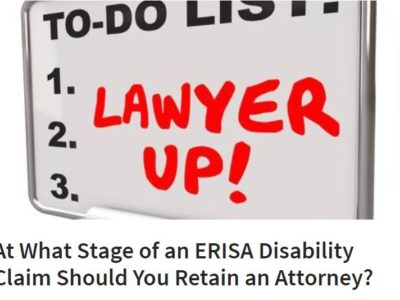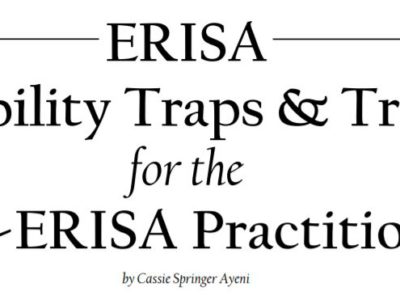Home » Blog Post » PRACTICE GUIDE: ERISA ISSUE SPOTTING – HOW TO AVOID MALPRACTICE

PRACTICE GUIDE: ERISA ISSUE SPOTTING – HOW TO AVOID MALPRACTICE
ERISA. The acronym strikes terror in the heart of many a lawyer. Fuzzy notions of fiduciary duties, equitable remedies in the days of a divided bench, and preemption can cause even the most erudite of attorneys to break into a cold sweat. My friends: speaking as someone who has handled ERISA claims, litigation, and appeals for 15 years, I’m here to tell you that it is really not that bad! Allow me to walk you through some ERISA basics so that you can issue spot and avoid malpractice.
ERISA Fundamentals
The Employee Retirement Income Security Act of 1974 (ERISA) provides minimum standards for voluntarily established benefit plans in the private industry. In addition to pension plans, ERISA governs health and welfare benefit plans, including employer-sponsored disability and life insurance plans. ERISA does not cover benefit plans established or maintained by governmental entities, churches for their employees, or plans which are maintained solely to comply with applicable workers compensation, unemployment, or disability laws. This means that UC plans are non-ERISA (government) plans, but an employer’s benefit plans are governed by ERISA.
ERISA requires plans to provide participants with plan information. ERISA § 104(b)(4). Those who manage and control plan assets must act as fiduciaries. ERISA § 404. ERISA plans must have a grievance and appeals process for benefit claims. ERISA § 503. The process of appealing a denied benefit claim is also called a “request for review,” and is crucial to achieving success on a denied benefit claim, either with the administrator or before a federal court. TIP: There is a 180-day deadline for submitting ERISA appeals that CANNOT be missed. Finally, ERISA gives participants and beneficiaries the right to sue for benefits and breaches of fiduciary duty. ERISA § 502(a). Lawsuits related to or remedied by ERISA are brought in federal district court. Statutes of limitations are often identified in the ERISA plans themselves and must be adhered to.
ERISA Preemption
ERISA has broad preemption provisions. ERISA § 514. If a remedy is available under ERISA, the claim will be preempted. If a case “relates to” an ERISA plan because there is a “connection with or reference to” a plan, the case will be preempted. Metro. Life Ins. Co. v. Massachusetts, 471 U.S. 724, 739. For example, in Ingersoll-Rand Co. v McClendon, the Supreme Court held that a wrongful discharge action was preempted by ERISA because the plaintiff alleged that the wrongful termination was primarily because of the employer’s desire “to avoid contributing to, or paying benefits under, the employee’s pension fund.” 498 U.S. 478, 483 (1990). However, in another case, the Supreme Court determined that California’s prevailing wage law is not preempted by ERISA because the law does not “make reference to” ERISA plans, nor does it have a connection to an ERISA plan because “[t]he prevailing wage statute alters the incentives, but does not dictate the choices, facing ERISA plans.” California Div. of Labor Standards Enf’t v. Dillingham Const., N.A., Inc., 519 U.S. 316, 328, 334 (1997).
As a general rule, if the alleged harm is that the unlawful conduct interfered with a right to receive, vest in, or accrue an employee benefit, then the claim will be preempted. Ingersoll-Rand Co. v. McClendon, 498 U.S. 133 (1990) (preempting a common law wrongful discharge claim where the claim was that the employer retaliated to prevent vesting in an ERISA plan). TIP: If you are concerned that your case will be pre-empted by ERISA, avoid alleging that any remedies are available under any kind of employee benefit plan or that any claims bear a connection to an employee benefit plan. Do NOT allege that the bad behavior caused a loss of employee benefits. Do NOT allege that the bad behavior should result in payment of disability or other ERISA benefits. These allegations will cause you to be removed to the federal courts that have exclusive jurisdiction over ERISA claims. And, if the claim is properly an ERISA claim for benefits, then there will be no consequential or punitive damages available, nor will there be a jury trial.
However, ERISA’s “savings clause” provision saves from preemption any law that regulates insurance, banking, or securities. ERISA § 514(b)(2)(A). An example of the application of the savings clause is in California’s “notice prejudice” rule, which provides that claims can proceed even where there is late notice unless the insurer is prejudiced by the late notice. Because this is a law that regulates insurance and does not provide a remedy that conflicts with ERISA, the law is not preempted. UNUM Life Ins. Co. of Am. v. Ward, 526 U.S. 358, 373, 119 S. Ct. 1380, 1389, 143 L. Ed. 2d 462 (1999).
ERISA Long-Term Disability Cases
While most people are familiar with ERISA governing pension plans, 80% of all ERISA litigation is actually over denied long-term disability (LTD) benefits.
- What is the LTD benefit?
Employer-sponsored LTD plans, also known as “group” disability insurance plans, generally provide benefits after 6 months of disability until retirement age. The benefit is typically 2/3 of pre-disability earnings. Unlike private disability plans, almost all ERISA LTD plans will offset other income or benefits including severance, workers’ compensation, Social Security Disability, state disability, and even retirement benefits received. TIP: if you are negotiating a settlement for your client, be sure that it cannot be characterized as an off-settable source of income to the ERISA LTD benefits, or the client will essentially have to hand over the settlement funds to the ERISA LTD insurer.
Example of a severance that will likely be offset 100%: “After the Separation Date, EMPLOYEE will receive payments from EMPLOYER totaling $65,000, constituting salary continuation, accumulated sick leave, lost wages, and severance pay.”
Example of a severance that will not likely be offset: “After the Separation Date, EMPLOYEE will receive payments from EMPLOYER totaling $65,000 as consideration for waiving the claims specified herein. This amount does not constitute salary continuation, accumulated sick leave, lost wages, or severance pay.”
If it is impossible to avoid the triggering language, just leave out the description as a last resort.
- When Is Someone Disabled?
Many ERISA LTD plans have an “own occupation” standard of disability that shifts to an “any occupation” standard of disability after 24 months. In other words, after 24 months, the claimant has to be disabled from any occupation given her education, training, experience, and station in life, to continue to receive LTD benefits.
Many ERISA LTD plans also have a 2-year limitation for certain conditions. Common limitations include mental illnesses, “self-reported” conditions, neuro-musculoskeletal disorders, chronic fatigue conditions, chronic pain conditions, allergies, and chemical sensitivities. TIP: if you are working with a disabled client’s physicians and there are also emotional distress issues, be aware that the mental health component should be listed as secondary to the physical component of the disability to avoid the 24-month mental health limitation in the ERISA LTD plan.
Types of Plans
There are two types of ERISA LTD Plans: insured and self-funded. With self-funded plans, the employer sets aside funds for qualified participants. Because the risk of payment lies with the employer, usually big employers like AT&T or Johnson & Johnson are the only employers providing self-funded plans. With these plans, non-preempted state law insurance protections do not apply. With insured plans, the employer purchases an insurance policy to provide disability benefits to its. Often, the insurer both decides liability and pays the benefits. The Supreme Court recognizes this as a structural conflict of interest. Metropolitan Life Ins. Co. v. Glenn, 128 S. Ct. 2343 (2008). In my experience, some insurers are better than others. Standard Insurance currently has the worst definition of disability, limiting so many conditions to 24 months that it shocks me when someone is eligible for benefits beyond two years; Liberty Mutual is particularly cantankerous in litigation.
POP QUIZ!
Time for some ERISA issue spotting!
1. If someone has a disability or other employee benefit claim, does ERISA govern if the employer is:
A: A private company?
B: Government (U.C., federal employee, state employee, public school teacher)?
C: A partnership that covers both partners and employees?
D: A private company where there are only owners but no employees?
Answers: A: Yes; B: No; C: Yes; D: No (there must be an employee covered as well for ERISA to govern)
2. If someone has been disabled from her “own occupation” for 24 months, then the plan switches to an “any occupation” standard of disability, is she still entitled to benefits where she is:
A: a lawyer with bipolar disorder who is told by the insurer to go get a job as a manual laborer?
B: a construction worker who has a high school education but who also has lifting restrictions, where the insurer tells her to go get a job as a receptionist for a construction company?
Answers: A: No (not appropriate given education, training, experience, and station in life); B: Yes (as long as the salary matches her station in life)
3. What allegations will be preempted by ERISA?
A. Discrimination caused the employee to lose accrual of retirement benefits.
B. Emotional distress resulted from denied disability claim.
C. Employee was not paid fair wages.
D. California’s “notice prejudice” rule trumps an ERISA Plan’s claim filing deadline.
Answers:
A: Preempted – remedy of restored retirement conflicts with ERISA’s remedy for a breach of fiduciary duty claim. Ingersoll-Rand Co. v McClendon, 498 U.S. 478, 483 (1990);
B: Probably preempted: one court has recently held that emotional distress claims, if they are independent from the lost benefit claims, can proceed in state court. Daie v. The Reed Grp., Ltd., No. C 15-03813 WHA, 2015 WL 6954915, at *3 (N.D. Cal. Nov. 10, 2015) (“Our defendants’ duty not to engage in the alleged tortious conduct existed independent of defendants’ duties under the ERISA plan.”);
C: Not preempted: California Div. of Labor Standards Enf’t v. Dillingham Const., N.A., Inc., 519 U.S. 316, 328, 334 (1997);
D: UNUM Life Ins. Co. of Am. v. Ward, 526 U.S. 358, 373, 119 S. Ct. 1380, 1389, 143 L. Ed. 2d 462 (1999).
A Final Tip: Don’t Waive Your Client’s ERISA Claims in a Severance Agreement
Finally, many clients call me after having accepted a “standard” severance agreement from their employer, where they unknowingly waived their ERISA disability claim rights. Oops! While ERISA pension claims vest and cannot be waived, the same is not true for ERISA health and welfare claims, including disability claims. Please be sure that your clients do not waive their ERISA rights, as their disability and life insurance plans in particular may be far more valuable to them than the severance itself. Employers are generally willing to agree to carve out ERISA disability and life insurance claims once they understand the ramifications.
Example of a good ERISA carve-out: … However, the following claims are specifically and expressly excluded from the foregoing Release: (i) health insurance benefits under the Consolidated Omnibus Budget Reconciliation Act (COBRA); (ii) claims with respect to benefits, including short- and long-term disability benefit benefits, under a welfare benefit plan governed by the Employee Retirement Income Security Act (ERISA); or (iii) claims with respect to vested benefits under a retirement plan governed by ERISA.
If you ever have a question about how to navigate ERISA’s tricky waters, call an experienced ERISA attorney. Us ERISA nerds are typically happy to field questions and co-counsel if you find yourself in over your head. I can be reached at cassie@benefitslaw.com if you have any questions. You can also find more information about ERISA on the Department of Labor’s Employee Benefits Security Administration (EBSA) website, at https://www.dol.gov/ebsa/.
Cassie Springer Ayeni is the President and Founder of Springer Ayeni, A Professional Law Corporation, in Oakland, CA, where she focuses on ERISA disability and life insurance cases. She can be reached at cassie@benefitslaw.com or www.benefitslaw.com




